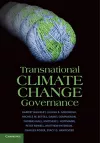
Transnational Climate Change Governance
8 authors - Paperback
£28.99
Harriet Bulkeley is a Professor in the Department of Geography at the University of Durham. Her research is concerned with the processes and politics of environmental governance, with particular expertise in the areas of climate change, energy and urban sustainability. She has published more than fifty books and articles, including Cities and Climate Change: Urban Sustainability and Global Environmental Governance (2003, with Michele Betsill), Governing Climate Change (2010, with Peter Newell) and Cities and Low Carbon Transitions (2011, edited with others). Liliana B. Andonova is a Professor and Chair in the Department of Political Science/International Relations at the Graduate Institute of International and Development Studies, Geneva. She has been appointed a Giorgio Ruffolo Fellow in Sustainability Science at Harvard University, and a Jean Monnet Fellow at the European University Institute. Her research and publications focus on institutional institutions, public-private partnerships, European integration, environmental cooperation, transnational governance and climate change. She is the author of Transnational Politics of the Environment: EU Integration and Environmental Policy in Eastern Europe (2003). Michele M. Betsill is a Professor of Political Science and the founder and co-leader of the Environmental Governance Working Group at Colorado State University, Fort Collins. Her research investigates the multiple ways in which climate change is governed from the local to the global level, across both public and private spheres. She is co-author of Cities and Climate Change: Urban Sustainability and Global Environmental Governance (2003, with Harriet Bulkeley) as well as numerous articles and book chapters on climate change governance. Professor Betsill is a member of the editorial boards of the journals Global Environmental Politics and Environment and Planning C: Policy and Government, and is on the Scientific Steering Committee for the Earth System Governance Project of the International Human Dimensions Programme on Global Environmental Change. Daniel Compagnon is a Professor of Political Science at Sciences Po Bordeaux, where he teaches globalisation and global environmental issues. His work is focused on understanding the dynamics of global environmental governance from a transcalar perspective, with a particular concern for southern countries and the impact of North/South international relations. His books include A Predictable Tragedy: Robert Mugabe and the Collapse of Zimbabwe (2010), which was ranked best book of the year on Africa by Foreign Affairs. Thomas Hale is a Postdoctoral Research Fellow at the Blavatnik School of Government, University of Oxford. His research seeks to explain how political institutions evolve – or not – to face the challenges raised by globalization and interdependence, with a particular emphasis on environmental and economic issues. Matthew J. Hoffmann is an Associate Professor in the Department of Political Science at the University of Toronto and Co-Director of the Environmental Governance Lab at the Munk School of Global Affairs. He is the author of Climate Governance at the Crossroads: Experimenting with a Global Response after Kyoto (2011) and Ozone Depletion and Climate Change: Constructing a Global Response (2005) and co-editor of Contending Perspectives on Global Governance (2005, with Alice Ba). Peter Newell is a Professor of International Relations at the University of Sussex. His current research interests lie in the political economy of climate change, especially in relation to carbon markets, ideas about a 'just transition' to a lower carbon economy and the governance of North-South clean-energy investment. He is co-author of the following books (amongst others): Climate Capitalism: Global Warming and the Transformation of the Global Economy (Cambridge University Press, 2010, with Matthew Paterson), Governing Climate Change (2010, with Harriet Bulkeley) and Globalization and the Environment: Capitalism, Ecology and Power (2012). Matthew Paterson is a Professor of Political Science at the University of Ottawa. His research focuses on the political economy of global environmental change. His publications include: Global Warming and Global Politics (1996); Understanding Global Environmental Politics: Domination, Accumulation, Resistance (2000); Automobile Politics: Ecology and Cultural Political Economy (Cambridge University Press, 2007) and, most recently, Climate Capitalism: Global Warming and the Transformation of the Global Economy (Cambridge University Press, 2010, with Peter Newell). He is a lead author for the Fifth Assessment Report of the Intergovernmental Panel on Climate Change. Charles Roger is a PhD student in political science and Liu Scholar at the Liu Institute for Global Issues, University of British Columbia. His research focuses on global environmental politics and international political economy, especially as related to the governance of climate change in developing and emerging economies. He is a contributing author to the Fifth Assessment Report of the Intergovernmental Panel on Climate Change. He is the co-editor of Climate Governance in the Developing World (2013, with David Held and Eva-Maria Nag) and Global Governance at Risk (2013, with David Held). Stacy D. VanDeveer is a Professor of Political Science at the University of New Hampshire. He is the author or co-author of more than 70 articles, book chapters, working papers and reports. He has co-edited six books, including Comparative Environmental Politics (2012), Changing Climates in North American Politics (2009) and Transatlantic Environment and Energy Politics (2009).